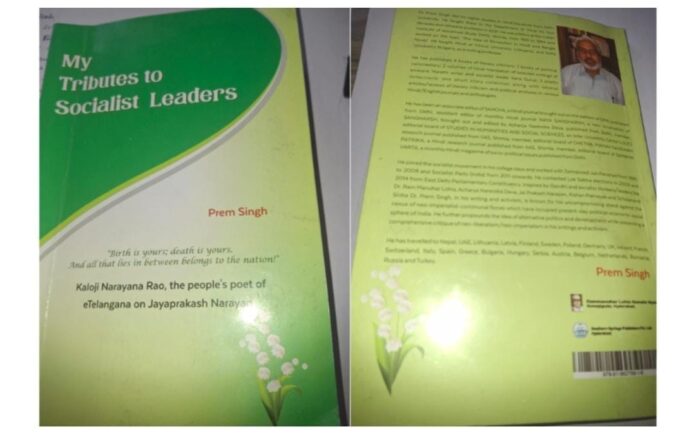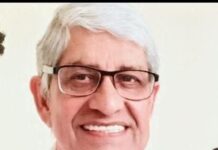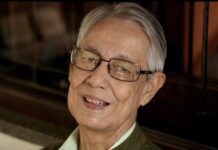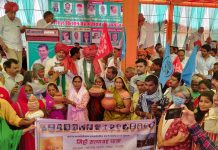It has rightly been asserted that the socialist tradition in India deserves a place in the narrative in the making of modern India. This assertion is made in the context of the contribution that the socialist leaders made during the evolution of the goals of the freedom struggle. People of India fought against the British imperialism not only for political freedom but also,
and more importantly, to establish an equitable social and economic system. Socialist leaders like Acharya Narendra Deva, Ram Manohar Lohia, Jaya Prakash Narayan, Minoo Masani, Ashok Mehta, Achyut Patwardhan struggled resolutely to get the principles of equity and social justice included in the programs of the freedom struggle and then in the post-independence period leaders like Madhu Limye, Karpoori Thakur, Chander Shekhar, Kishan Patnaik George Fernandes, Mrinal Gore and Justice Sachar etc. worked relentlessly to achieve those objectives.
The book in reference by Prem Singh, himself a socialist crusader, is a collection of tributes and obituaries of some of the prominent leaders of the Socialist movement in India whom he has known personally and had interacted with them. Some of those are Madhu Limaye, Kishan Patnaik, Mrinal Gore, Justice Sachar, George Fernandes, the stormy leader, and Karpoori Thakur who was a committed socialist in the times of neo-liberalism. He has also written about leaders and activists like Surendra Mohan, Sathi Sunil, Brijmohan Toofan, Vinod Prasad Singh, Bhai Vaidya, Raghuvansh Prasad Singh, Jagdish Tirodkar and Keshav Rao Jadhav.
The author in his tributes along with his impressions, has counted the contribution of each one of them towards the advancement of the socialist movement in India. Each one of them had sincerity and honest views about how India can be developed for satisfying the needs of the modern competitive world without compromising Indian values and ethos. They expressed their concerns about the threats of divisive forces and suggested various ways and means to eradicate the scourge of communalism and casteism, which was perceived as a major obstacle in the growth of the Indian economy.
Prem Singh offers profound tributes to the memory of Madhu Limaye. Madhu Limaye led a simple life and was a proponent of the idea of equality in political life. He was deeply concerned with the challenge posed by communal and separatist forces. To dismay of some and given the unlikelihood of a revolution, he proposed reviving Congress as a means to strengthen the Indian state. In this context Madhu Limaye though attacked communal forces in a brilliant manner, he chose not to comment of the consumerist capitalism by the Congress. Consumerism is the main hindrance in the way of establishing egalitarian society.
Prem Singh admires Chander Shekhar for he was a practical politician within the parameters of socialist ideology. He will always be remembered for his opposition to liberalism. He was clear in his ideological convictions and had the political courage to convey his mind to even the bigwigs in international politics. His conviction stemmed from Gandhian economic philosophy as he was opposed to new economic policies. That is why he resisted the prescriptions of the World Bank and IMF when he told them with clarity and confidence that “the market economy run by you is confined to a very small population…..they do not constitute the entire nation”. He was firm with his belief that globalization would not benefit the larger poor population of the country.
Likewise, Surendra Mohan was a crusader against neo-liberalism. In an obituary to him Prem Singh noted that Surendra Mohan’s strong association with socialism made him synonymous with the movement against neo-liberalism in a positive and realistic manner. He was of the firm belief that organisations and groups opposing neo-liberalism should work as colleagues and associates in pursuit of common objectives. He was always in the forefront to espouse the cause of the Dalits and marginalised sections of the society and thus expanded and intensified the scope of the socialist idea. Surendra Mohan was a prolific writer and contributed extensively in both Hindi and English newspapers and magazines.
Dr Prem Singh in his obituary to Mrinal Gore feels sad that the champions of socialism and secularism were indifferent towards political views and contribution of Mrinal Gore. She had earned the epithet of ‘Pani Wali Bai’ when she led a successful campaign in Goregaon to ensure the availability of drinking water for all sections of society. During the 1990s, she maintained a firm stance to underscore the adverse effects of the new economic policies. Her political work was based on the values of democracy. She was equally sensitive about the gender issues and inter-caste marriage. It was unfortunate that following her passing, the then Prime Minister referred to her as a social worker in his condolence message, without acknowledging her political identity and contributions.
Dr Prem Singh had special bond with Bhai Vaidya and Justice Sachar. They were his inspiration. He always addressed Bhai Vaidya as ‘Bhai’ as a mark of respect for him, and Justice Sachar as Sachar Saheb. Passing away of both of them within a gap of 18 days in April 2018 left a void in Prem Singh’s world. Prem Singh’s admiration for them goes beyond the ideological moorings. Bhai Vaidya born in 1928 participated in the Quit India Movement at a young age of fourteen and, even became a member of the CSP in 1946. He had participated in the movement for the liberation of Goa and JP movement in the 1970s. He was jailed under MISA during the period of Emergency (1975-77). He was essentially a political person. He was greatly influenced by the works and thoughts of Jyotiba Phule and Dr B. R. Ambedkar. Bhai Vaidya was a strong critic of new economic policy. He believed that this would have disastrous consequences for the society and nation building. Bhai was consistent in his opposition to neo-imperialism and privatization of education.
Justice Sachar or Sachar Saheb’s personality was like a ‘masterpiece, epic in its dimensions’. Prem Singh characterizes him as a ‘classic personality in this absurd period’. Sachar Saheb had immense faith in socialism, secularism, democracy, civil rights, individual freedom and the non-violent mode of protest against injustice. Sachar was clear in his views about neo-liberal policies of the governments. He was against the privatisation of the public sector undertakings. He held that neo-liberal policies promote communalism and blind nationalism and, of course, superstition andthese stalwarts within a fortnight was an irreparable loss to the politics of values instilled and nurtured during the movement for the freedom of the country.
Socialists of all shades consider the principles of consumerist capitalism, neo-liberal policies of the governments, particularly post-1991, are against the establishment of an egalitarian society and culture. The most eloquent critique of neo-liberalism was imparted by Kishan Patnaik, for whom Prem Singh has offered glowing tributes and devoted the largest number of pages. In his tribute Prem Singh begins with a touching quote from Kishan Patnaik that “the big irony of the second half of the 20th century in India is that in post-sixties intellectuals have done nothing to explain any of the issues being faced by the civil society. Poverty, disease, illiteracy, unemployment, corruption, slavery, war, humiliations and suicides have left their mark on the age, but the intellectual class of India can hardly claim to have offered or suggested even a remote solution to a single problem”.
Patnaik’s remorse is not misplaced, as the consciousness of common citizens is influenced by the notions constructed by the intelligentsia. Philosophical articulations reach down to the man at the end of the ladder of society through various means like visual arts, performing arts such as theater and cinema, social influencers, literature: poetry and prose, all of them individually or combined, help common citizens to visualize the rights and wrongs of the contemporaneous situations. It is unfortunate that in modern times, despite the revolution in communication technology, there is a complete divide between common citizens and the intelligentsia. This is largely because of economic inequality, high illiteracy and dominance of non-local languages, the root cause of the decay of human dignity.
The most important point that comes from Patnaik’s thought process is that India’s intellectuals became the spokespersons of Western ideas at the cost of Indian thoughts propounded by leaders/activists of the freedom movement, compatible with Indian reality. They even mocked the Indian thought as regressive, superstitious and without foundations. Western thought came in handy to establish themselves as scholars in clusters of cosy environs of institutes and centres.
Kishan Patnaik characterised this as a period which is devoid of scriptural values and thought, ‘shastra viheen’ and vichar viheen. What is even more perilous is that in the era of ‘globalisation and liberalisation, intellectuals are trading their intelligence at high prices’. Prem Singh substantiates his argument by quoting Gajanan Madhav Muktibodh and his poem ‘Andhere Mein’, which says that the intellectual class has become kreetdaas or a purchased slave.
Kishan Patnaik has given an example of how a professor left his job at the University of Delhi to launch a TV channel and became an instrument to spread neo-liberal ideology. This situation is likened to the subordination of the bauddhik varg. There is no guilt about their getting into the trappings of neo-colonialism and globalisation. They are not conscious of their subordination either. Nevertheless, Kishan Patnaik saw the glimmer of hope in the growing awareness among the Dalit, Tribal and Backward groups and their democratic movements, though at smaller scale to fight against the scourge of globalisation. These movements, though at smaller levels, reflect the rising consciousness against the subordination of the lesser-known intellectuals.
This consciousness against intellectual subordination was there during the medieval period of Indian history as well. Prem Singh invokes the sixteenth-century poet Malik Muhammad Jayasi, who in his classic Padmavat, narrates a tale that a Brahman who approached a caged parrot brought for sale in the market and asks whether it is “guni” or knowledgeable or empty of virtues/knowledge nirguni”? The caged parrot in its terse and candid reply says ‘I had virtues when my soul was free from the cage. Oh “jajmaan” what virtue (guna) would I have when I am in captivity? I am brought here for sale in a cage. “Pandit hoi so haat na Chadha” means a knowledgeable is one who does not allow himself to be purchased in the market for sale.
The core of the episode is that the wise man who selis his intellect loses his individuality. His knowledge is lost. The parrot in the episode, being conscious of captivity, reflected ‘the strong craving to be free from the bondage’. This awareness of being held in subjugation, according to Kishan Patnaik, is the key to intellectual freedom. It is unfortunate that this consciousness is often absent today. ‘There is no awareness and no remorse’. But still, Kishan Patnaik had not lost hope. In the end, he was optimistic that the time would come when the ‘intellectual class would reclaim the role of the regulator of the society’. The question, however, remains will the Al or the reassertion of the capitalistic power will allow the awakening to happen?
Prem Singh regrets that the display of vulgar capitalism and criminal communalism has taken deep roots in the society and polity of the nation. Resistance is too feeble to make an impact. This is a “wretched tragedy”. The socialist leaders have made efforts to fight the cancer of communalism and casteism in their own way, individually or collectively. The present collection of Tributes is a reminder that alternatives to neo-liberalism do exist, ‘vikalpheen nahin hai duniya’. But how to give meaning and articulation to alternatives is a moot question.
(Author: Professor Harish C. Sharma, Former Head History, Guru Nanak Dev University, Amritsar)
Discover more from समता मार्ग
Subscribe to get the latest posts sent to your email.

















